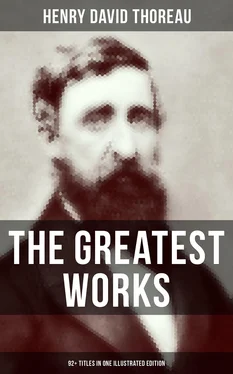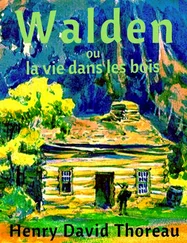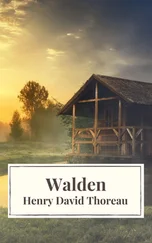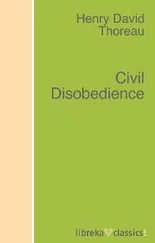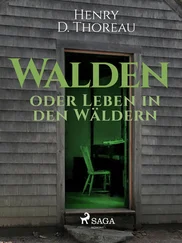When I was four years old, as I well remember, I was brought from Boston to this my native town, through these very woods and this field, to the pond. It is one of the oldest scenes stamped on my memory. And now to-night my flute has waked the echoes over that very water. The pines still stand here older than I; or, if some have fallen, I have cooked my supper with their stumps, and a new growth is rising all around, preparing another aspect for new infant eyes. Almost the same johnswort springs from the same perennial root in this pasture, and even I have at length helped to clothe that fabulous landscape of my infant dreams, and one of the results of my presence and influence is seen in these bean leaves, corn blades, and potato vines.
I planted about two acres and a half of upland; and as it was only about fifteen years since the land was cleared, and I myself had got out two or three cords of stumps, I did not give it any manure; but in the course of the summer it appeared by the arrowheads which I turned up in hoeing, that an extinct nation had anciently dwelt here and planted corn and beans ere white men came to clear the land, and so, to some extent, had exhausted the soil for this very crop.
Before yet any woodchuck or squirrel had run across the road, or the sun had got above the shrub oaks, while all the dew was on, though the farmers warned me against it — I would advise you to do all your work if possible while the dew is on — I began to level the ranks of haughty weeds in my bean-field and throw dust upon their heads. Early in the morning I worked barefooted, dabbling like a plastic artist in the dewy and crumbling sand, but later in the day the sun blistered my feet. There the sun lighted me to hoe beans, pacing slowly backward and forward over that yellow gravelly upland, between the long green rows, fifteen rods, the one end terminating in a shrub oak copse where I could rest in the shade, the other in a blackberry field where the green berries deepened their tints by the time I had made another bout. Removing the weeds, putting fresh soil about the bean stems, and encouraging this weed which I had sown, making the yellow soil express its summer thought in bean leaves and blossoms rather than in wormwood and piper and millet grass, making the earth say beans instead of grass — this was my daily work. As I had little aid from horses or cattle, or hired men or boys, or improved implements of husbandry, I was much slower, and became much more intimate with my beans than usual. But labor of the hands, even when pursued to the verge of drudgery, is perhaps never the worst form of idleness. It has a constant and imperishable moral, and to the scholar it yields a classic result. A very agricola laboriosus was I to travellers bound westward through Lincoln and Wayland to nobody knows where; they sitting at their ease in gigs, with elbows on knees, and reins loosely hanging in festoons; I the home-staying, laborious native of the soil. But soon my homestead was out of their sight and thought. It was the only open and cultivated field for a great distance on either side of the road, so they made the most of it; and sometimes the man in the field heard more of travellers’ gossip and comment than was meant for his ear: “Beans so late! peas so late!” — for I continued to plant when others had begun to hoe — the ministerial husbandman had not suspected it. “Corn, my boy, for fodder; corn for fodder.” “Does he live there?” asks the black bonnet of the gray coat; and the hard-featured farmer reins up his grateful dobbin to inquire what you are doing where he sees no manure in the furrow, and recommends a little chip dirt, or any little waste stuff, or it may be ashes or plaster. But here were two acres and a half of furrows, and only a hoe for cart and two hands to draw it — there being an aversion to other carts and horses — and chip dirt far away. Fellow-travellers as they rattled by compared it aloud with the fields which they had passed, so that I came to know how I stood in the agricultural world. This was one field not in Mr. Coleman’s report. And, by the way, who estimates the value of the crop which nature yields in the still wilder fields unimproved by man? The crop of English hay is carefully weighed, the moisture calculated, the silicates and the potash; but in all dells and pond-holes in the woods and pastures and swamps grows a rich and various crop only unreaped by man. Mine was, as it were, the connecting link between wild and cultivated fields; as some states are civilized, and others half-civilized, and others savage or barbarous, so my field was, though not in a bad sense, a half-cultivated field. They were beans cheerfully returning to their wild and primitive state that I cultivated, and my hoe played the Rans des Vaches for them.
Near at hand, upon the topmost spray of a birch, sings the brown thrasher — or red mavis, as some love to call him — all the morning, glad of your society, that would find out another farmer’s field if yours were not here. While you are planting the seed, he cries — “Drop it, drop it — cover it up, cover it up — pull it up, pull it up, pull it up.” But this was not corn, and so it was safe from such enemies as he. You may wonder what his rigmarole, his amateur Paganini performances on one string or on twenty, have to do with your planting, and yet prefer it to leached ashes or plaster. It was a cheap sort of top dressing in which I had entire faith.
As I drew a still fresher soil about the rows with my hoe, I disturbed the ashes of unchronicled nations who in primeval years lived under these heavens, and their small implements of war and hunting were brought to the light of this modern day. They lay mingled with other natural stones, some of which bore the marks of having been burned by Indian fires, and some by the sun, and also bits of pottery and glass brought hither by the recent cultivators of the soil. When my hoe tinkled against the stones, that music echoed to the woods and the sky, and was an accompaniment to my labor which yielded an instant and immeasurable crop. It was no longer beans that I hoed, nor I that hoed beans; and I remembered with as much pity as pride, if I remembered at all, my acquaintances who had gone to the city to attend the oratorios. The nighthawk circled overhead in the sunny afternoons — for I sometimes made a day of it — like a mote in the eye, or in heaven’s eye, falling from time to time with a swoop and a sound as if the heavens were rent, torn at last to very rags and tatters, and yet a seamless cope remained; small imps that fill the air and lay their eggs on the ground on bare sand or rocks on the tops of hills, where few have found them; graceful and slender like ripples caught up from the pond, as leaves are raised by the wind to float in the heavens; such kindredship is in nature. The hawk is aerial brother of the wave which he sails over and surveys, those his perfect air-inflated wings answering to the elemental unfledged pinions of the sea. Or sometimes I watched a pair of hen-hawks circling high in the sky, alternately soaring and descending, approaching, and leaving one another, as if they were the embodiment of my own thoughts. Or I was attracted by the passage of wild pigeons from this wood to that, with a slight quivering winnowing sound and carrier haste; or from under a rotten stump my hoe turned up a sluggish portentous and outlandish spotted salamander, a trace of Egypt and the Nile, yet our contemporary. When I paused to lean on my hoe, these sounds and sights I heard and saw anywhere in the row, a part of the inexhaustible entertainment which the country offers.
On gala days the town fires its great guns, which echo like popguns to these woods, and some waifs of martial music occasionally penetrate thus far. To me, away there in my bean-field at the other end of the town, the big guns sounded as if a puffball had burst; and when there was a military turnout of which I was ignorant, I have sometimes had a vague sense all the day of some sort of itching and disease in the horizon, as if some eruption would break out there soon, either scarlatina or canker-rash, until at length some more favorable puff of wind, making haste over the fields and up the Wayland road, brought me information of the “trainers.” It seemed by the distant hum as if somebody’s bees had swarmed, and that the neighbors, according to Virgil’s advice, by a faint tintinnabulum upon the most sonorous of their domestic utensils, were endeavoring to call them down into the hive again. And when the sound died quite away, and the hum had ceased, and the most favorable breezes told no tale, I knew that they had got the last drone of them all safely into the Middlesex hive, and that now their minds were bent on the honey with which it was smeared.
Читать дальше
